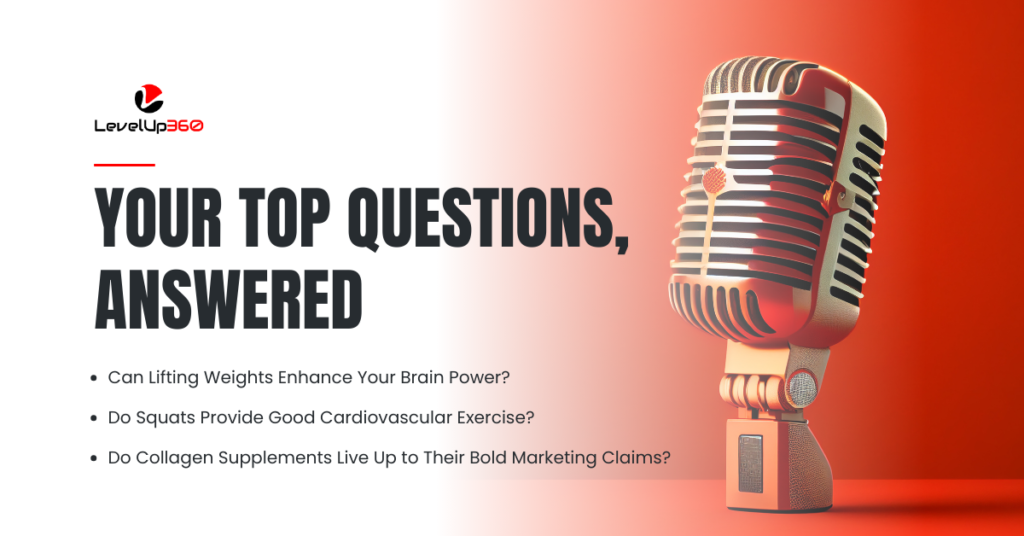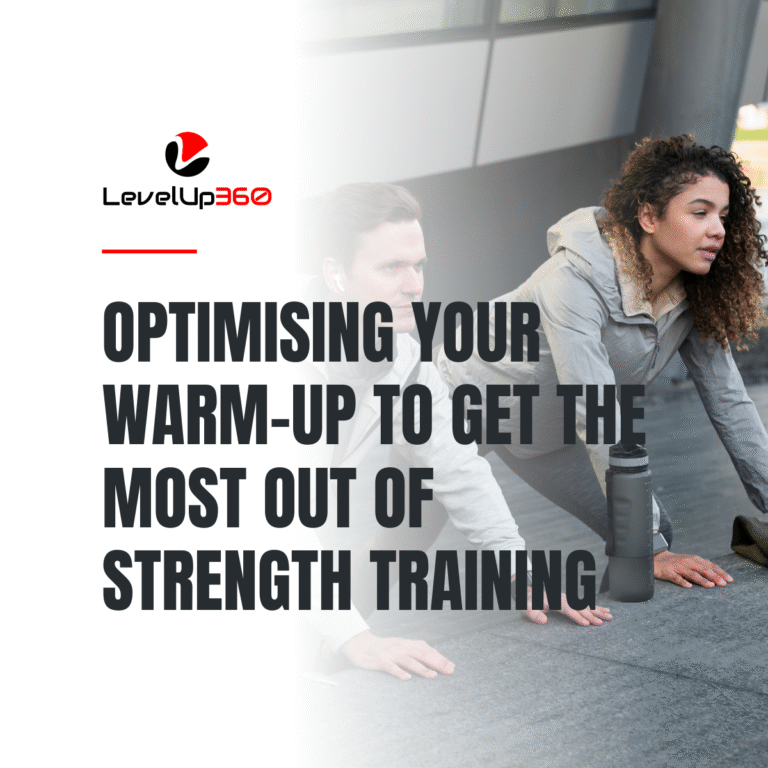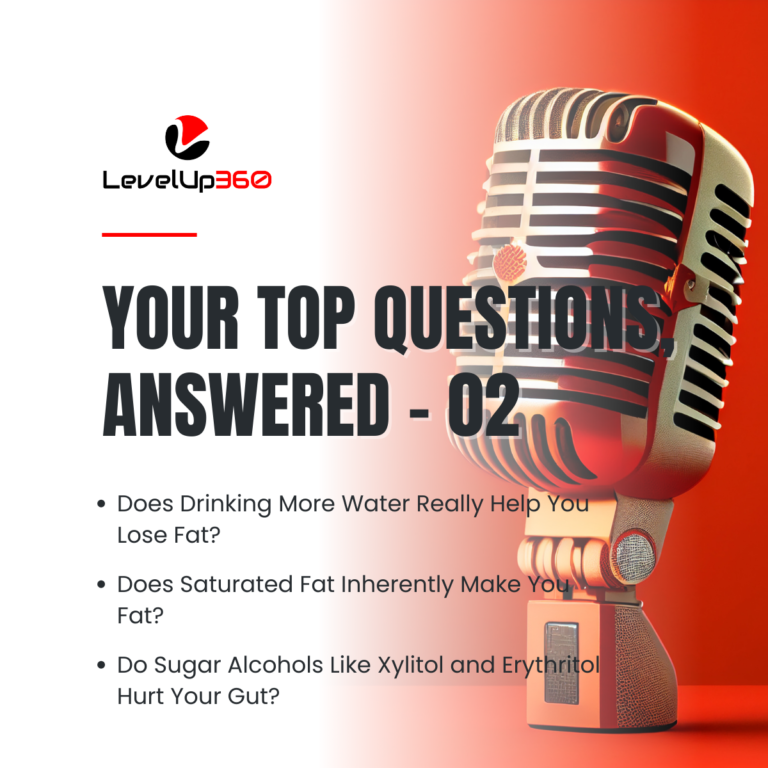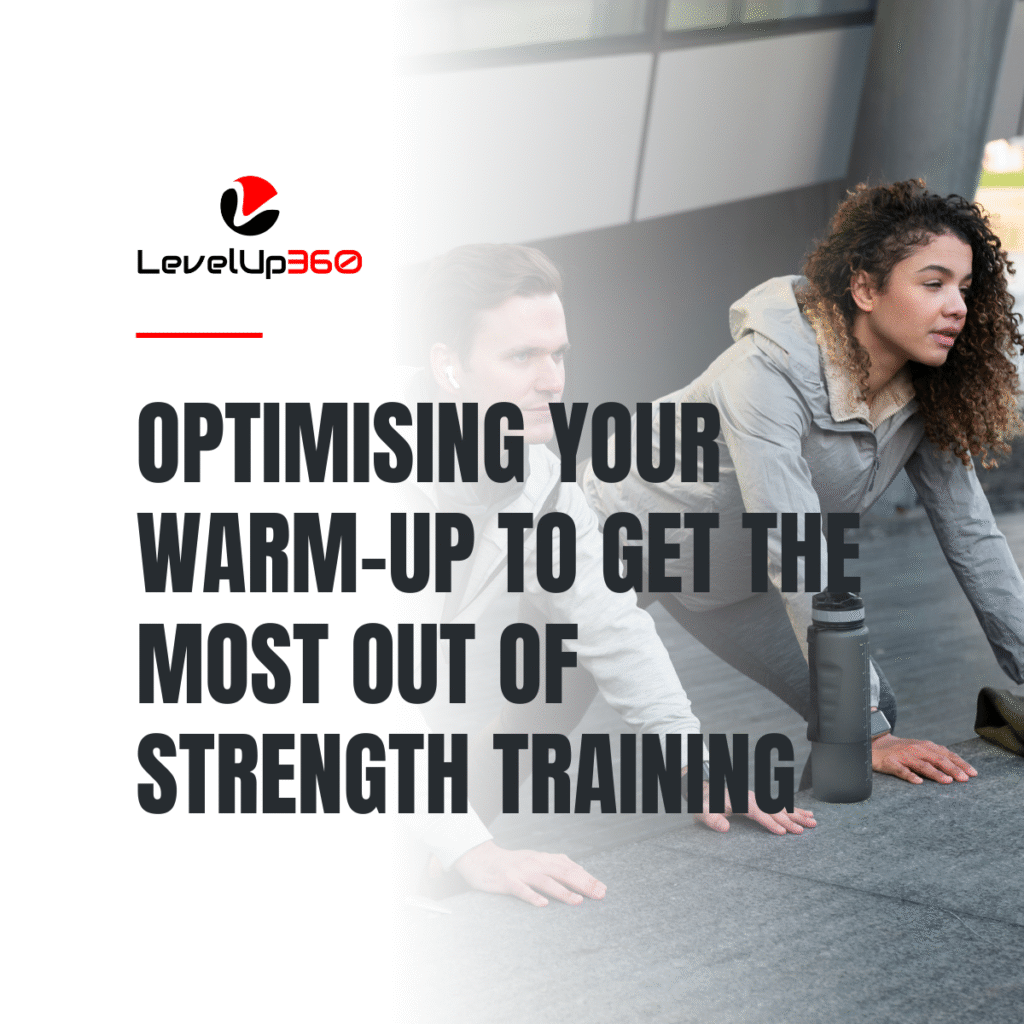
Your Top Health and Fitness Questions, Answered:
Can Lifting Weights Enhance Your Brain Power?
Do Squats Provide Good Cardiovascular Exercise?
Do Collagen Supplements Live Up to Their Bold Marketing Claims?
In this Q&A article, we explore some common questions on how different types of exercise can impact brain health, cardiovascular fitness, and joint health.
Specifically, we look at whether lifting weights can make you smarter, if squats provide good cardio, and whether collagen supplements live up to their marketing claims.
Can Lifting Weights Enhance Your Brain Power?
Question
I have heard that aerobic exercise like jogging can boost learning and memory. But can lifting weights also achieve the same?
Answer
That’s an excellent question. There’s substantial research demonstrating that a single session of moderate-intensity aerobic exercise, such as brisk walking, light jogging, or gentle cycling, performed right before a study session can enhance learning and memory. For example, a meta-analysis that analysed 26 studies on acute aerobic exercise and memory. They found aerobic exercise performed prior to learning new information significantly improved long-term memory recall after a delay, compared to remaining sedentary. The average effect size was 0.52, indicating a medium-sized effect.
Experts think aerobic activity facilitates learning by temporarily increasing key chemicals in the brain like dopamine, norepinephrine, and serotonin. These chemicals essentially wake up your brain cells and prep them for optimally encoding new information into memory. It’s like giving your neuronal network a quick cup of coffee right before the big exam to perk up your memorisation skills.
But what about pumping iron? One recent study had participants perform a bout of resistance exercise prior to completing a visual memory test. Unfortunately, later on during recall testing, the lifters’ memory performance wasn’t any better than those who remained completely sedentary beforehand.
While more research is still needed, acute resistance exercise currently appears less effective than aerobic activity for providing an immediate boost to memory and learning. This could be because the metabolic demands of lifting weights do not increase those memory-enhancing chemicals in the brain to the same magnitude as moderate-intensity cardio. The catecholamine response from aerobic exercise seems necessary to optimise memory encoding and recall in the few hours immediately following exercise.
However, over months and years of training, regular resistance exercise likely still enhances cognitive function and brain health across the lifespan by increasing baseline levels of key proteins like brain-derived neurotrophic factor (BDNF). BDNF nourishes existing neurons, stimulates the growth of new neurons and synaptic connections, and promotes overall neuroprotection.
For example, animal research shows resistance training specifically increases BDNF levels in the hippocampus, a critical brain region involved in learning, memory formation, and spatial navigation. In humans, experienced weightlifters also often exhibit greater resting BDNF concentrations compared to untrained individuals.
So while cardio exercise provides your recall and academic performance an immediate short-term edge, resistance training still appears to support lifelong brain health and cognitive abilities into old age. The key brain-boosting mechanisms simply operate on different timescales.
For optimal memory, executive function, processing speed, and general cognitive performance throughout life, most experts agree that incorporating both aerobic and resistance training is prudent. Cardio exercise enhances acute cognition and memory encoding, while resistance training confers general neuroprotective effects across decades by mechanisms like BDNF upregulation.
Bottom line
Don’t ditch the barbells totally in favour of cardio for your mental fitness. But ideally, incorporate both aerobic and resistance exercise for maximum cognitive gains across your lifespan.
Do Squats Provide Good Cardiovascular Exercise?
Question
I finish intense squat workouts feeling completely exhausted and winded. Does that mean squats can replace traditional cardio exercise for improving heart health?
Answer
Performing challenging multi-joint lifts like squats definitely revs up your heart rate and breathing – but whether it truly substitutes for cardio depends how you define “cardiovascular exercise”.
First examining oxygen consumption and calories burned, research shows that performing multiple demanding sets of squats can match the acute cardiovascular demands of moderate-intensity traditional aerobic activities like jogging, especially when lifting with higher volumes and minimal rest between sets.
This ramped up oxygen usage makes sense – squatting engages tremendous muscle mass across the thighs, hips, and glutes. Your heart and lungs work hard to deliver oxygenated blood to power all those large lower-body muscle groups through intense contractions.
However, for calorie-burning efficiency, straight “cardio” like running still wins hands down. To burn 300 calories, 30 minutes of continuous jogging absolutely crushes over an hour of hard resistance training. So if your main goal is fat loss, classic aerobic exercise remains the most time-efficient approach.
Squatting and other multi-joint lifts also fail to produce the same muscular adaptive changes that increase cardiovascular endurance capacity compared to traditional cardio training. Activities like running, swimming, cycling, and rowing drive robust increases in mitochondria, capillary density, oxidative enzymes, and glycogen stores within the trained muscles.
While resistance training does confer some of these muscular adaptations, the magnitude is much smaller than dedicated low or moderate-intensity aerobic training. The metabolic changes induced by lifting are “cardio light” compared to those achieved by steady-state endurance exercise. Squatting alone likely won’t maximise your VO2 max.
There are also key structural differences between aerobic and strength training when it comes to heart health. Traditional cardio exercise induces eccentric hypertrophy of the left ventricular chamber, allowing more blood to be pumped out with each beat. Lifting weights can remodel heart muscle too, but not to the same degree as daily endurance training.
For well-rounded cardiovascular fitness and heart health, most experts recommend blending dedicated steady-state cardio and resistance training. Squatting provides definite cardiovascular benefits, but likely isn’t enough by itself for optimal heart health over the long term.
Bottom line
Intense squat sessions absolutely qualify for cardiovascular exercise when judged by acute oxygen demands. But for maximal endurance capacity and long-term heart health, a varied training program that includes both resistance and traditional aerobic work remains the best bet.
Do Collagen Supplements Live Up to Their Bold Marketing Claims?
Question
I constantly see ads for collagen supplements boasting benefits for joints, muscles, performance, and more. Is any of this legit or just hype?
Answer
The marketing claims around many collagen supplements absolutely exceed what rigorous scientific research supports so far. Early evidence shows minimal benefits for direct improvements in muscle growth, strength, or power compared to proven complete protein supplements like whey or casein that contain all the essential amino acids.
A handful of studies pairing collagen supplements with strength training in older, previously untrained adults have observed modest improvements in muscle mass and fat loss compared to exercise alone. However, these people were not actively engaged in resistance training prior to the research starting.
Inexperienced weightlifters and athletes, collagen supplementation does not appear to enhance muscle growth or performance to the same extent as supplements providing complete, amino-rich proteins necessary for muscle protein synthesis. This aligns with collagen’s incomplete amino acid profile lacking key anabolic stimuli like leucine.
However, collagen supplementation may confer more consistent benefits for joint health and connective tissue resilience based on the current literature. Multiple studies demonstrate collagen can alleviate pain and improve physical function in individuals already suffering from osteoarthritis.
A few studies also report faster recovery of muscle strength and reduced muscle soreness after strenuous eccentric exercise when taking collagen versus placebo. While the mechanisms driving these effects remain unclear, some researchers hypothesize collagen provides raw material to reinforce connective tissues around joints and tendons.
More high-quality research is still needed to cement collagen’s potential advantages, especially in athletic populations. But the initial findings are intriguing for collagen’s ability to support joint health and connective tissue integrity – particularly if someone follows a diet naturally low in traditional collagen sources such as bone broth or tough cuts of meat.
Bottom line
The hype around collagen transforming your muscles, gym performance, and body composition likely surpasses the reality. But collagen does appear promising as a supplemental joint and connective tissue aid, not as a stand-alone solution for building strength and muscle mass.
While more rigorous data is warranted, athletes and active individuals could consider trying collagen at 5-15 grams daily but should not abandon proven muscle-supporting proteins like whey or casein. Coupling collagen with resistance training and a high-protein diet likely maximises any potential auxiliary performance and recovery benefits. But realistic expectations are crucial.
Recommended reading
Recommended reading
Additional Resources
Feeling in control of your health
If you are interested in improving your health and wellness, check out other resources such as Our Blog, Free Resources and/or join our private Body-Mind Transformation Secrets Community on Facebook, and go on an even deeper dive with me to uncover how to succeed in your health and wellness goals.
You may also be interested in our Sleep Secrets Cheat Sheet. It is a great resource with strategies to fix and optimize your sleep which is crucial to succeeding in your health and wellness goals.
Resources
Pictures








